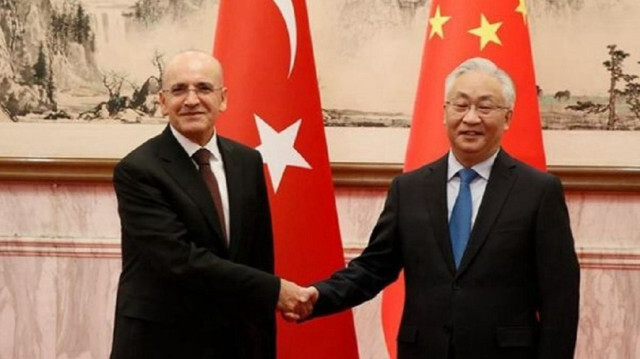

File photo
Türkiye and China explore cooperation in industrial, digital, green transformation, 5G, and more
As Türkiye and China hold landmark bilateral cooperation talks in Beijing, Ankara believes that mutually beneficial collaboration between the two sides will help nurture peace, prosperity and stability on a regional and global scale, according to a top official.
Senior officials from the two countries met in the Chinese capital Thursday at the second meeting of the Türkiye-China Intergovernmental Cooperation Committee (ICC), the highest-level consultation mechanism between the two nations.
Co-chaired by Turkish Finance Minister Mehmet Simsek and Chinese Vice Premier Zhang Guoqing, this was the first Türkiye-China ICC in eight years.
China is Türkiye's top trade partner in Asia and the third-largest globally. It was also one the first nations to assist Türkiye after powerful earthquakes devastated much of the country's southern region in early 2023, something Simsek thanked the Chinese side for during the ICC meeting.
Simsek outlined the two countries' efforts to increase trade with China while seeking a more sustainable, balanced relationship through mutual investments, energy cooperation, boosting tourism, and joint ventures in aviation and agriculture.
He also noted that Turkish President Recep Tayyip Erdogan and Chinese President Xi Jinping are advancing bilateral relations in every field with the shared interests of both nations' peoples in mind.
The finance minister stressed Türkiye's support for China's Belt and Road Initiative and announced that a joint working group held its first meeting on Wednesday to harmonize both initiatives.
Türkiye aims to strengthen cooperation with China in industrial, digital, and green transformation, as well as in transportation, finance, culture, and health, he said, adding that Ankara is “a natural center of attraction for international investments.”
As the 17th-largest economy globally in terms of US dollar exchange rate and the 11th in purchasing power parity, Türkiye's economy has grown an average of 5.5% annually over the past two decades.
Simsek noted that Türkiye has customs union or free trade agreements with 54 countries, including the EU, and that 60% of Turkish exports are shielded from protectionism. He highlighted the country's geographic proximity to key regions and its robust infrastructure, incentive programs, and offerings.
On the threat of terrorism, Simsek affirmed Türkiye's ongoing fight against it and emphasized that security cooperation with China was a priority. “We are against terrorist activities targeting China's territorial integrity and sovereignty,” he said, reiterating Türkiye's commitment to the One China policy.
Zhang, for his part, stated that Türkiye and China, as emerging Global South markets, share common interests and potential for cooperation in natural resources, traditional energy, infrastructure, 5G connectivity, biology, medicine, pharmaceuticals, unmanned train cars, and renewable energy.
He also revealed that bilateral trade had reached $44 billion last year, doubling the 2015 figure, with expectations for continued growth.
On cultural and humanitarian matters, Zhang said both countries align on issues such as the wars in Gaza and Ukraine, jointly advocating for global justice. He also mentioned that Türkiye's arts, culture, and education are increasingly attracting Chinese tourists.
#China
#meeting
#Mehmet Simsek
#Türkiye
#Türkiye-China Intergovernmental Cooperation Committee
#Zhang Guoqing
